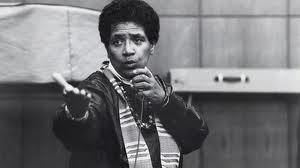Rage, Language and Audre Lorde
[Photo: Courtesy of Youth Activists-Youth Allies Network. A group of young people sitting in a circule of chairs in a community center.]
In a colorful circle of young people, organizers, teachers and students, a young woman called Zainab shared her experience of what happened to her that day: “I was getting sexually harassed by this dickhead on the street, and when I went and told two cops who were standing right in front of him: they did nothing and continued to tell me that I should probably think about what I was wearing before I stepped out of the house!” Zainab was wearing a beautiful sundress that day, her legs freely expressing her happiness with her body and the weather. The two cops were women of color, and Zainab was even angrier that two women whose lived experience was probably more similar to hers showed no solidarity with her situation. They were actively perpetuating the same sexist thinking that patriarchal society has embedded in our social fabric, women of color, men, brothers alike.
This is a reality in most women’s lives, and when we start talking about our lived experiences as women, we often find ourselves running out of time to discuss everything that’s on our minds. “Do we have time to talk about sexism, patriarchy and self esteem right now?” I thought to myself. We were running on a tight schedule that day, where I was to facilitate a workshop on the occupation of Palestine, something the young folks are eager to learn more about. I thought about the stories that would reveal themselves to be necessary learning experiences and expressions of self. The narratives would prove to re-affirm the hyper-sexist, misogynist culture we live in. The room was filled with women, and I wondered how many of them went through similar, if not more odious violations of their femininity, of their safety, their self-esteem.
We were in a space where we shared stories of sexual assault that highlighted a culture of patriarchy, and each story was connected with a person’s unique emotional experiences. Most of us grew up in New York City, spoke English, had experienced the public school struggle, and were working part-time gigs. I’m always intentional about facilitating dialogue with people in controlled settings that are reflective of many of the values I find are needed for a safe space. We were youth, activists, leaders, and women who had dissident and critically conscious voices. I loved the culture of conversation in certain activist spaces; it was always filled with energy and things that I learned from consistently. We spoke regularly of a culture that is masterful at finding reasons to justify rape and victim blaming, rather than teaching men not to rape. We spoke of a patriarchy beyond male-cis-gendered binaries, and placed sexuality within a critical pedagogy framework that actively dismantled colonized notions of our identities and communities.
A young woman named Siranha, wearing her brightly patterned skirt with elephants and sanskrit, and her matching wooden earrings, raised her hand to speak.
“I just want to scream ‘Fuck you!’ You know? I want to ask them to stop being such dick head douchebags and go jerk off. I want to ask them what the fuck their mothers have taught them, and how I cannot wait till they have daughters.”
I listened attentively as Siranha passionately spoke about her personal reaction to sexual harassment. Her energy captivated me, and I thought of the emotions that run through my head when I’ve escaped what-I-thought-to-be-a-deadly-encounter with a man on my walk home late at night. As a woman, I connected with her experience. As a youth trainer, I had to think like the “teacher-in-me” who wants to encourage “positive” dialogue and expression of emotion.
But then, I thought: what’s positive?
As youth trainers and community organizers, we build movements through dialogue. In spaces like this workshop creates, we talk about what triggers trauma and how we can understand our experiences as part of a broader system of structural oppression.
Siranha’s comment garnered a response. Shaila had remarked: “God, that woman is so angry.”
I winced.
God. Siranha is so angry. This young woman of color fit the exact stereotype I often find myself battling. She was the angry woman of color who will loudly dismiss people by saying “Fuck you!” while calling people “dickheads and douchebags.” Siranha and Zainab had both shared stories of men that violated their sexuality, their womanhood, and their humanity. They had both experienced traumatizing situations, that more often than not repeated themselves, and were victims of a culture that did not see them as human.
But how many women of color have had to suppress their emotions in order to not be characterized as an angry woman of color? I thought about anger, and the experiences that evoke similar emotions that we have not processed as a community. We experience difficult situations that test our patience, our resilience, our ability to deal with the world. Our communities of women, marginalized people and traumatized communities have never been given the opportunity to break down all these experiences and learn how to deal emotionally. We never address anger as a transformative experience; I’ve grown up learning being angry is a negative thing and that I must control the way I react to a sexist, racist, classist society. I identified with the anger of this young woman—it was the same anger I found myself battling when I dealt with, for example, the Muslim feminist “liberators” who claimed the hijab was oppressive.
Siranha’s comment sheds light on a reactionary dialogue that plays itself out in many of the interactions that women, young people, oppressed communities, and marginalized people have: her side comment exemplified how our society reacts to anger. We are dismissive of anger, regardless of whether or not it is a justified reaction to violence, sexism, racism and classism. We tell ourselves that anger is really just a signifier of weakness, thereby creating an environment where the normalization of a traumatic, violent, and oppressive culture is seen as appropriate. We silence victims who have every right to be angry and to take up space with that anger.
We end up perpetuating an affective police state where we tell people like Zainab, a woman whose worst case scenario reaction would be to curse out the police officers, that they are wrong for reacting that way. We tell women like Siranha, whose impulsive reaction to sexual harassment would be to threaten her harassers, that they need to control their emotions. We prescribe patience and perseverance as a solution.
The world is full of situations that evoke anger in us. The raw emotions of hate we feel for violence, discrimination and oppression—this is justified rage. We saw this anger when members of organizations like One Billion Rising and Indian women demanded capital punishment for the men who raped Jyoti Singh in Delhi, and when women formed vigilante groups throughout Uttar Pradesh to combat sexual violence. The pervasive culture of sexual violence has organized cries of anger throughout communities across the world, particularly angry women of color who are taking matters into their own hands and mobilizing their communities through grassroots initiatives.

[Photo: Audre Lorde speaking with one hand held towards the viewer and the other holding a microphone to her lips.]
In her essay Uses of Anger, feminist scholar, poet, and political activist Audre Lorde describes anger as a “well stocked arsenal […] potentially useful against those oppressions, personal and institutional, that have brought those emotions into being.” Lorde looks at anger by examining the microaggressions oppressed communities, particularly women of color, face daily. She re-conceptualizes anger as a positive tool for social change, while calling out the elite white supremacist class that is quick to dismiss people of color and their expressions of self. The same anger that we are suppressing and silencing has been created by a system that is actively prescribing silence.
This anger is a marker of the truth in a system built on lies. It is the truth because it is grounded in our lived experience. If we let it be dismissed, then the oppression that caused the anger is tossed aside too. We are women of color and working class immigrants who are policing our own thoughts for fear of being labeled and told that we are angry, too loud, too aggressive, or too “hood.”
I am actively lifting the veil on our raw emotions by encouraging uncensored language, and discouraging emotional policing.
Lorde goes on to write, “I cannot hide my anger to spare your guilt, nor hurt feelings, nor answering anger; for to do so insults and trivializes all our efforts.”
Anger is a legitimate form of expression that should be accepted, supported, and used as crucial evidence of lived experience as we build our analyses of the social dynamics that produce such internal tension. Anger is a legitimate tool for analyzing social relationships and our guilt or reluctance to express our anger is socially constructed, and upheld by a society that does not process their emotions enough.
The way we express our anger—the language we use to communicate our emotions—is bound up in the structures of oppression that create mainstream narratives around the use of anger. Our language is policed, the manner in which we express ourselves is deemed “sensitive” or “over-dramatic,” and there are always hindrances within this oppressive structure in dealing with these emotions. We are told profanity is not classy, so screaming “Fuck you!” at an abuser is a fault on our side. We are told that we must be patient and these normalized experiences of oppression are a test to our personality, instead of creating a narrative that challenges the perpetrator. Processing anger can be a tool for transformative justice, and the way in which we air our legitimate feelings. Reclaiming language is a political act. We can take back words that are deemed “inappropriate” and confront people with the emotions that those words signify. In order to not alienate people in our communities, we must legitimize their opinions and accept the language they use to express themselves.
A big part of self-care and understanding our relationships and the role we play in the world around us is taking a careful look at the interpersonal dynamics in the social fabric of our lives. Unfortunately, in a world where we have less and less time to process our feelings, with little or no time for self-care and community building. Our emotions are often dismissed and devalued. It is critical to recognize feeling as a part of an ethos of self-care, and to include processing our reactions to a world that is making it more difficult for us to connect to our communities and our non-consumer oriented selves within that.
I myself am processing anger, as a valid emotion that should be legitimized by our community and shedding light on social dynamics. I’m learning how to create dialogues around situations of anger, and how we can be more critical of emotional and physical factors that influence behavioral patterns and the dialogue around our behavior. A community that is inclusive of anger involves dialogue around anger, and the way in which we express our anger to be deconstructed and re-addressed inclusive of the power dynamics. We must address the colonization of language, our identities and our interpersonal relationships within these processes. Anger must be looked at through a transformative lens, and community practices should be revolving around the dynamic experiences of trauma, violence and oppression.
Keep up with Sharmin on Twitter @SharminUltraa.


